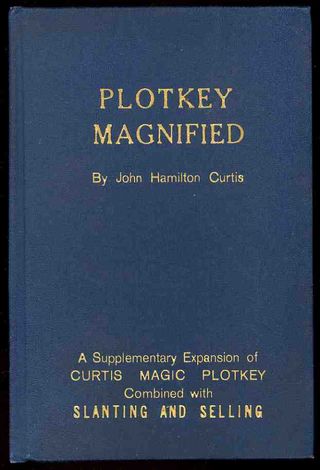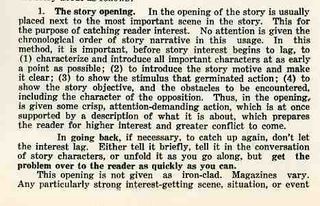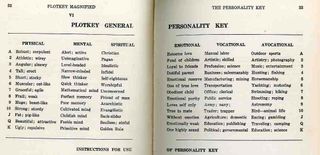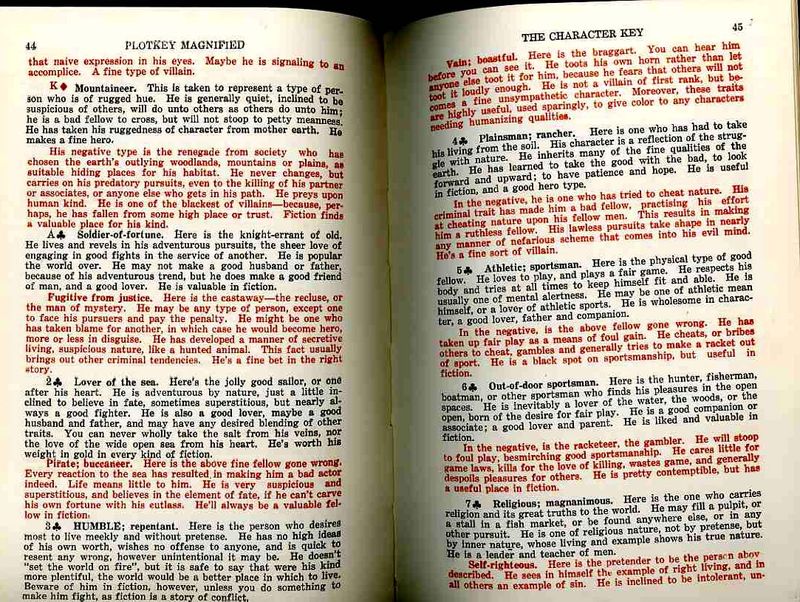JF Ptak Science Books LLC Post 351
 The title to this post probably does live up to itself--this bit, The Plotkey Magnified, by John Hamilton Curtis, reads as though it were written by a long-down-the-list loser of a Hemingway-imitation contest, and thunk-up with the vigor of a five-beer bar date. (Interestingly, the work, printed but not published in 1937, was prepared by the author for himself--we learn this info on the title page, along with the author's address, which was PO Box D, Eagle Rock, California.. It must've been a pretty small post office if their boxes were identified with letters.) The subtitle to this work pretty much sums it up: A Supplemetary Expansion of Curtis Magic Plotkey Combined with Slantng and Selling. The one thing that the author forgot was punctuation and grammar, which somehow shook themselves loose of his book, and which I'm guessing were sold in those now-disappeared tiny paper bags that you used to get at Reiman's Hardware store in 1966. He also forgot how to write, as some of his efforts are just truly bad, and occasionally painful. For example, we have the following exceptional declaration:
The title to this post probably does live up to itself--this bit, The Plotkey Magnified, by John Hamilton Curtis, reads as though it were written by a long-down-the-list loser of a Hemingway-imitation contest, and thunk-up with the vigor of a five-beer bar date. (Interestingly, the work, printed but not published in 1937, was prepared by the author for himself--we learn this info on the title page, along with the author's address, which was PO Box D, Eagle Rock, California.. It must've been a pretty small post office if their boxes were identified with letters.) The subtitle to this work pretty much sums it up: A Supplemetary Expansion of Curtis Magic Plotkey Combined with Slantng and Selling. The one thing that the author forgot was punctuation and grammar, which somehow shook themselves loose of his book, and which I'm guessing were sold in those now-disappeared tiny paper bags that you used to get at Reiman's Hardware store in 1966. He also forgot how to write, as some of his efforts are just truly bad, and occasionally painful. For example, we have the following exceptional declaration:
And so, these two paragraphs speak for themselves in their own special way.
What Mr. Curtis was trying to do here with this publication was (a) make a little money and (b) selling a manual of some calculated "ideas" for story and character development to people writing detective fiction for detective novels. Nothing really works here--the author shouldn't have written it because he couldn't write, and certainly couldn't teach all of the stuff about writing that he couldn't have known;and the readers shouldn't have bought it because if they couldn't write before reading the book they doubley-couldn't write after using it. And I do mean "using" it rather than "reading" it. Incredibly, the book is set up to have its ideas dismembered and set up in the fashion of a card deck, the reader dealing themselves out pieces of characters and scenes and locales, with Mr. Curtis offering more than two dozen (!) different types of physical, mental, spiritual, emotional, vocational and avocation descriptions encompassing the totality of human nature. Even though these descriptions of the human condition are minimal, liminal and sturdily stupid, they are funny in an outsider, disturbed vein of insight. The 'physical personality" aspects like athletic/wirey; fat/pig-like(?) rub up hard against things like the removed "spiritual" personality traits, which include "christian, pagan, idealistic, infidel, unconcerned, back-slider, soulless-sinful". Throw in the mental, and emotional stuff plus the interest and jobs sections and you can concoct some spectacular Frankensteinian-monster personality assignments: for example, at random, you can develop a character for your detective story who is fat and pig like with a poor memory, a back-slider who loves themselves only, is a trapper, and is interested in "entertainment". Wow. These ingredients can get mixed and coddled into a witches brew of old tripe that would compose an unlikely and heinous small town population that should probably be buried rather than read about--remember, you're supposed to use this cookbook as The Guide to Creativity for the short story you're trying to sell to "Muscle Culture".
I must say though that what I take away with me from this experience is an idea for turning this book into some sort of naive-surreal card/board game that is made to produce purposefully bad fiction, the sort of writing that is really hard to do; writing good bad, where the loser is the winner in a game of retro-badness. Not easy. Soldier.






This reminds me of a booklet I'd borrowed on interlibrary loan once that was a thesaurus of sorts, a list of words therapists might use to reframe the statements of their clients. I was fascinated with the idea but disappointed with the booklet itself. Many of the words were improbable and Latinate and begging for meaning themselves, since they were surely so rarely used. I photocopied the thing, in case I changed my mind about it, but I wouldn't even know where to look for it now. I'd like to see it again. The relevant point here is that some tools can help with expression, but there's no substitute for the careful thought and consideration behind what's being expressed. Wait, wait! If you give me a minute, I think I can say something even more truistic ...
Posted by: Jeff | 04 November 2008 at 11:34 AM
Hmmm. Really? But tell me, Herr D., how does this make you feel?
Seriously though I'd be very curious to see this book of your's--sounds like a flash book for not very creative shrinklings. Seems to me that I remember something like a cheat book for Jerry Ford, a little play book, that helped him to redirect questions into something that he could answer. And I think that there were like 40 answers that everything could be directed too. Poor Jerry.
But now that you've been thinking about this book you'll undoubtedly run into it unexpectedly in the next few months....at least that what my interior analyst tells me.
Posted by: John Ptak | 04 November 2008 at 01:08 PM
This is amazing.
Posted by: harriet tubman | 04 November 2008 at 01:42 PM
I'm happy to see that Harriet Tubman is active on the Internet. She still looks as good as she did a hundred years ago.
Posted by: Jeff | 04 November 2008 at 06:39 PM